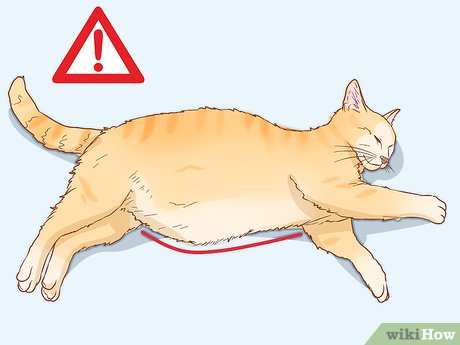In this Article of Animal Expert we will explain why a cat has a swollen and rigid belly, the severity of this situation will depend on the causes of this, among which are internal parasitic infections, feline infectious peritonitis or hyperanocorticism, as we will see below.All these circumstances will be more or less likely when we meet a cat, cat or kitten.We will also see how to prevent and act on this problem.
The most common cause that explains why a cat has a swollen and hard belly is the presence of internal parasites, especially in a young kitten, so if we catch a kitten we will probably notice that its belly is abnormally large, in this case, we must go to our veterinarian to prescribe a complete product in order, and at the same time , take advantage to establish a dewoparitation program adapted to the characteristics of our kitten.
- It is also very likely that we will find the cat with swollen belly and diarrhea.
- Caused by damage of parasites in the digestive system when the infestation is considerable.
- We could also see worms or blood in the stool.
- Sample of these faeces and observe it under the microscope to identify the type of parasite present and thus adapt the treatment.
- It should be noted that it is not always possible to locate the parasite in a single sample.
- In which case it is necessary to collect them several days a week.
- In all cases veterinary assistance is necessary.
- As an intense infestation in a kitten can cause severe diarrhea that dehydrates and endangers your life.
Ascites are the buildup of fluid in the abdominal cavity.It can have different causes and veterinary treatment is needed to identify and treat it.Ascites may be the reason our cat has a hard, swollen belly.In the following sections we will see what are the most common causes of ascites in cats.
Feline infectious peritonitis, also known as PIF, is one of the most serious diseases that explains why a cat has a swollen and stiff belly, is a viral pathology that causes inflammation of the peritoneum, which is the membrane that coats the inside of the abdomen, or in different organs, such as the liver or kidneys.Being a virus, there is no other treatment than support.In addition, there is a vaccine against this disease, which is highly contagious in cats.
In addition to ascites, there are other symptoms such as chronic fever that does not improve, anorexia, weight loss or lethargy, there may also be breathing problems from pleural effusion and, depending on the organs affected, there may be jaundice, neurological problems etc.
The presence of tumors in the liver is another cause that can explain why our cat has a swollen and stiff belly, this disorder is more common in older cats, which also present other generally nonspecific symptoms, that is, common to various diseases and that usually occur when the damage is already advanced.
In addition to bloating, which gives the impression that the cat has a large or loose belly, you may notice anorexia, lethargy, weight loss, increased water consumption and urination, or vomiting, it will be our veterinarian who makes the diagnosis.The prognosis is reserved and will depend on the type of tumor.
Although rare, this disease might explain why a cat has a hard, swollen belly.Hyperatenorticism or Cushing syndrome is caused by excessive production of glucocorticoids caused by tumors or hyperplasia, requires veterinary treatment and follow-up.
Other symptoms include lethargy, increased intake of food, water and urine in advanced stages, weakness, hair loss or, above all, extremely fragile skin.
In addition to the aforementioned causes that explain why a cat may have a swollen and stiff belly, it is also possible to observe this situation in the cat if it is in labor, due to the effect of contractions that aim to compress the uterus to facilitate the exit kittens.However, bloating in cats also occurs in the case of uterine pathologies, which may be associated with infections that require veterinary treatment, so sterilization is recommended to avoid these and other serious disorders.
This article is for informational purposes only, in Animal Expert.com.br we cannot prescribe veterinary treatments or make any type of diagnosis, we suggest taking your pet to the veterinarian in case of any type of condition or discomfort.
If you would like to read articles similar to, we recommend that you visit our Other Health Problems section.

